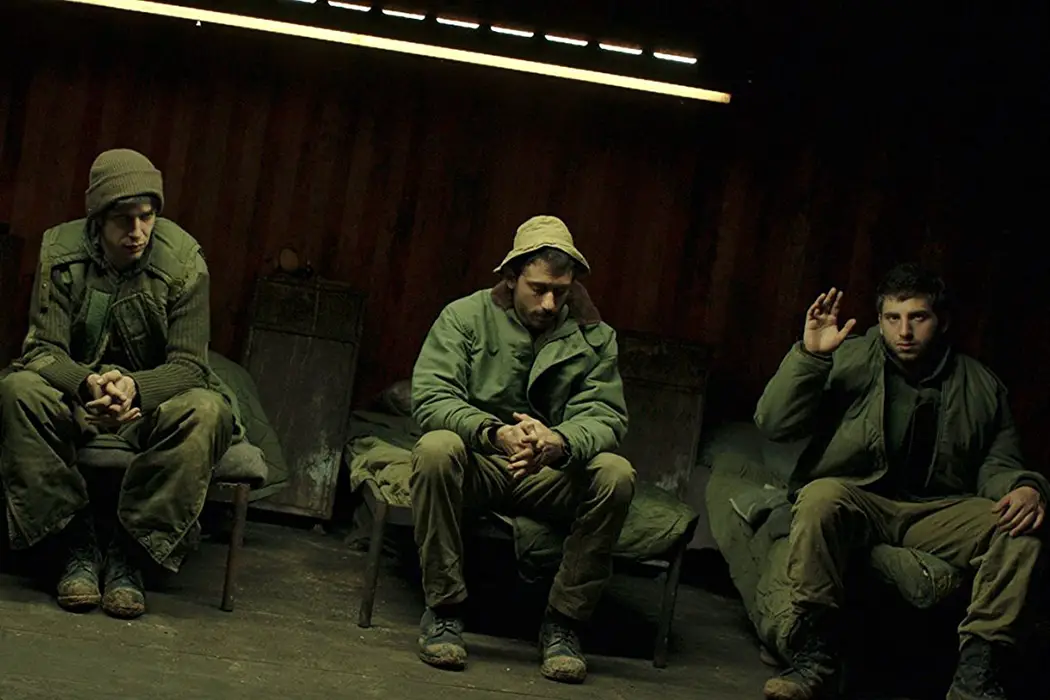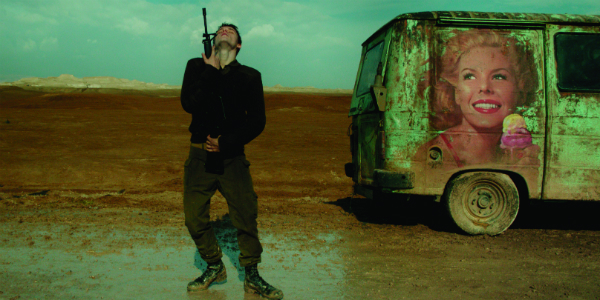FOXTROT: A Potent Family Tragedy That Bustles With Life

Gus is a 3rd year English Lit and Creative Writing…
Our world has turned sideways, and is slowly sinking down into the mud. At least that’s one of the statements Samuel Maoz makes in his blistering Foxtrot, as four young soldiers sleep restlessly in a rusty bunker that’s sharing the exact same fate. Foxtrot is brazenly political and did indeed lead to Israel’s Minister of Culture publicly denouncing it, but it is also a mournful family tragedy, a desperately cruel comedy, and a wonderfully realised take on escapism in the face of mounting listlessness.
It begins not with these four soldiers, who are stranded on the edge of Earth watching camels rather than cars pass by their military checkpoint, but with a husband and wife being delivered the news of the death of their son, Jonathan Feldman. The messengers’ faces aren’t in shot as they greet the couple, but the couple’s certainly are. Maoz makes clear that Foxtrot is a film that runs on emotion over logic, and reaction over cause of reaction: in its bold formalism, its saturated world, and in the characters that inhabit said world.
Is No News Better Than Bad News?
The wife, Dafna (Sarah Adler), faints abruptly. While she is sedated and carried to a bed, the husband, Michael (Lior Ashkenazi) takes in the news. He manages to keep upright, at least, but the camera doesn’t. It circles above, examining Michael as a specimen and visually translating his headspace; his psyche exteriorised and scrutinised like a test subject.
This is one of many methods in which Maoz’s visual filmmaking deftly pairs with Foxtrot’s lofty themes. Over the course of the day, the moods of Jonathan’s parents shift and amplify as anguish turns into incredulity. It’s a tidy summation of the film’s ambitious tonal switches: the first act’s mundane urbanity gives way to a sand-strewn outpost that’s perversely suffocating in its expanse.

Here, we have our four soldiers. One of them is named Jonathan Feldman (Yonathan Shiray) – is this a flashback? A twist? Another Jonathan Feldman? As our brains are stuffed full of thoughts on the matter, the soldiers are simply stuck trying to think of something, anything, to talk about. From their bunker they traverse a muddy stretch of land to reach their outpost – the trek is shown in full; it takes up time, like the soldiers want it to. Out here there’s nowhere to turn to: the frame crowded with a vast painterly vista, turning the men into background noise.
Still, paradoxically, Foxtrot’s most barren location possesses the most life – following a quickfire conversation on what a ‘foxtrot’ dance is, Feldman does away with dialogue and shows us his moves: cue a stunning 1-minute interlude set to Perez Prado’s ‘Que Rico Mambo’. It’s a gorgeous life-affirming sequence that juxtaposes the intense grief bookending the film. Judging by Feldman’s ability and the continuation of the dance as a motif in the third act, it’s clear that the young soldier is more at home in dance shoes than in army boots; an additional dose of irony to Maoz’s intricately weaved plot.
Dance Your Worries Away
The foxtrot, as it turns out – and as you may have guessed from the film’s title – isn’t simply an excuse for a joyous intermission. It’s a dance with a four move structure, whereby the fourth move returns to the starting point of the first – and Maoz builds his film’s structure around this potent metaphor, hammering in the futility of society, life, and the act of trying to make something of it.
Yet in the second-act stretch, Foxtrot’s miserabilism keeps to the edges – until, well… it doesn’t. A camel trudging along a well-worn dirt path and waiting for the soldiers’ border control barrier to lift up is played for laughs – another group of visitors, partying in a car battered and bruised with rain, is anything but.

Maoz balances these shifts in tone with ease, applying a farcical quality that justifies his film’s persistent mood swings – and one that rears its ugly head in the closing image. So when a second-to-third act swing is glued together through a bawdy animation, it’s hardly surprising – though entirely welcome.
What is surprising, however, is how utterly devastating this third-act turns out to be; bolstered by Lior Ashkenazi’s sensitive and unembellished performance – his face a tapestry of despair – Foxtrot does away with war altogether and renews itself as an urgent examination of grief. The futility remains, but the film’s color palette takes on a sepia hue now, draining the second act’s vibrancy. The daring formalism, too, also falls to the wayside, the camera at rest and fixing its gaze on the Feldman family and their coping with loss.
Conclusion: Foxtrot
Samuel Maoz’s Foxtrot toys with our emotions, but that doesn’t mean it lacks any of its own. This is an energetic and structurally audacious jukebox of sensations, prioritising impulse over precision and thought over action.
It is a celebration of existence and a condemnation of how difficult it is to do anything with it – never mind the controversy in Israel; the situation may be specific but Foxtrot’s themes are universal. Gushing with life and with enough life to make you gush, Maoz has created a film that refuses to become mired in the same mud that has entrapped its characters and turned them sideways.
What are your thoughts on Foxtrot?
Does content like this matter to you?
Become a Member and support film journalism. Unlock access to all of Film Inquiry`s great articles. Join a community of like-minded readers who are passionate about cinema - get access to our private members Network, give back to independent filmmakers, and more.
Gus is a 3rd year English Lit and Creative Writing student who loves everything film and still doesn't understand why he didn't study that instead. He is the co-editor for Venue, the arts supplement of his Uni's newspaper, and has written for Little White Lies, ScreenRant, Dog and Wolf, BritFlicks and Outline Norwich.













